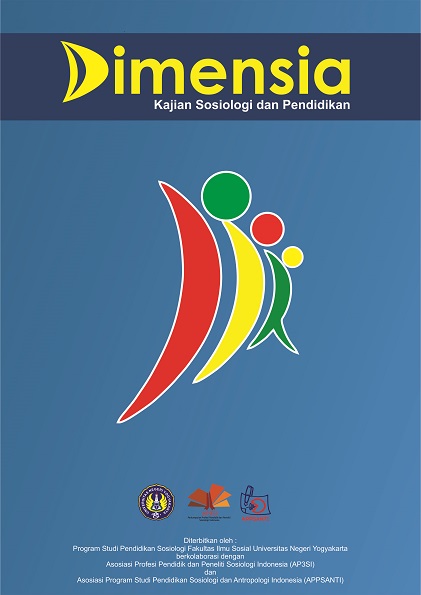PERAN LSM KUSUMA BUANA DALAM PENDAMPINGAN PSK DI DESA BONGAS, INDRAMAYU, JAWA BARAT
DOI:
https://doi.org/10.21831/dimensia.v6i1.3368Abstract
LSM Kusuma Buana is one of social institution which focus with countermeasures on sex worker problem in Bongas Vilage, Indramayu, Jawa Barat. The purpose of LSM Kusuma Buana to be effort autonomous for PSK. Purpose of this reseacrh are: 1). To description profil of LSM Kusuma Buana as social institution to handle PSK problem. 2). To description character of LSM Kusuma Buana to handle PSK problem in Bongas, Indramayu, Jawa Barat.
This research uses kualitatif research methods. Were used primary and secondary data sources. Technique obtained in this research is descriptive analysis that is the data which obtained in this research presented the analyzed descriptively to get an idea about the facts. Information obtained by using purposive sampling tecnique, that is sampling based on speatic objectives. Informats in this study is the LSM Kusuma Buana, prostitutes and former prostitutes. Data was collected by interview methocl, passive participant observation, documentation and literature studies. To examine the validity of this data source using triangulation techniques source and methods. Techniques which used in analyzing the data is data colection, data reduktion, data presentation, and conclusion.
The result showed that: 1). LSM Kusuma Buana as social institusion is the first in Bongas Vilage in assitance prostitutes. 2). The role of LSM Kusuma Buana or Kusuma Bongas as home and friend for sex worker, besides its role as facilitator and catalyst, coach and education, as well as colector of capital. 3). Assistance by LSM Kusuma Buana formed a working group named Kusuma Bongas to empower sex worker by providing mentoring programs, such as community empowerment in the form of revolving capital and education about the worse effect of prostitutions and AIDS, health service and skills activties. Form of empowerement that was given to comecrial sex worker and sex worker make increasingly independent and empowered. 4). Empowerment was given to the prostitutes greated positively by them, because the program can empower prostitutes in Bongas Vilage, Indramayu, Jawa barat.
Key words: role of social institutional, assistance program, empowerement
Downloads
Published
How to Cite
Issue
Section
License
Penulis yang menerbitkan jurnal ini menyetujui ketentuan berikut:
- Penulis memegang hak cipta dan memberikan hak publikasi pertama kepada jurnal dengan karya tersebut secara bersamaan dilisensikan di bawah Lisensi Atribusi Creative Commons yang memungkinkan orang lain untuk berbagi karya dengan pengakuan atas kepenulisan karya dan publikasi awal di jurnal ini.
- Penulis dapat mengadakan perjanjian kontrak tambahan yang terpisah untuk distribusi non-eksklusif dari karya versi terbitan jurnal (misalnya, mempostingnya ke repositori institusi atau menerbitkannya dalam buku), dengan pengakuan atas publikasi awalnya pada tahun jurnal ini.
- Penulis diizinkan dan didorong untuk memposting karya mereka secara online (misalnya, di repositori institusi atau di situs web mereka) sebelum dan selama proses penyerahan, karena hal ini dapat mengarah pada pertukaran yang produktif, serta kutipan karya yang diterbitkan lebih awal dan lebih banyak (Lihat The Pengaruh Akses Terbuka).
====================================================
Authors who publish with this journal agree to the following terms:
- Authors retain copyright and grant the journal right of first publication with the work simultaneously licensed under a Creative Commons Attribution License that allows others to share the work with an acknowledgement of the work's authorship and initial publication in this journal.
- Authors are able to enter into separate, additional contractual arrangements for the non-exclusive distribution of the journal's published version of the work (e.g., post it to an institutional repository or publish it in a book), with an acknowledgement of its initial publication in this journal.
- Authors are permitted and encouraged to post their work online (e.g., in institutional repositories or on their website) prior to and during the submission process, as it can lead to productive exchanges, as well as earlier and greater citation of published work (See The Effect of Open Access).







